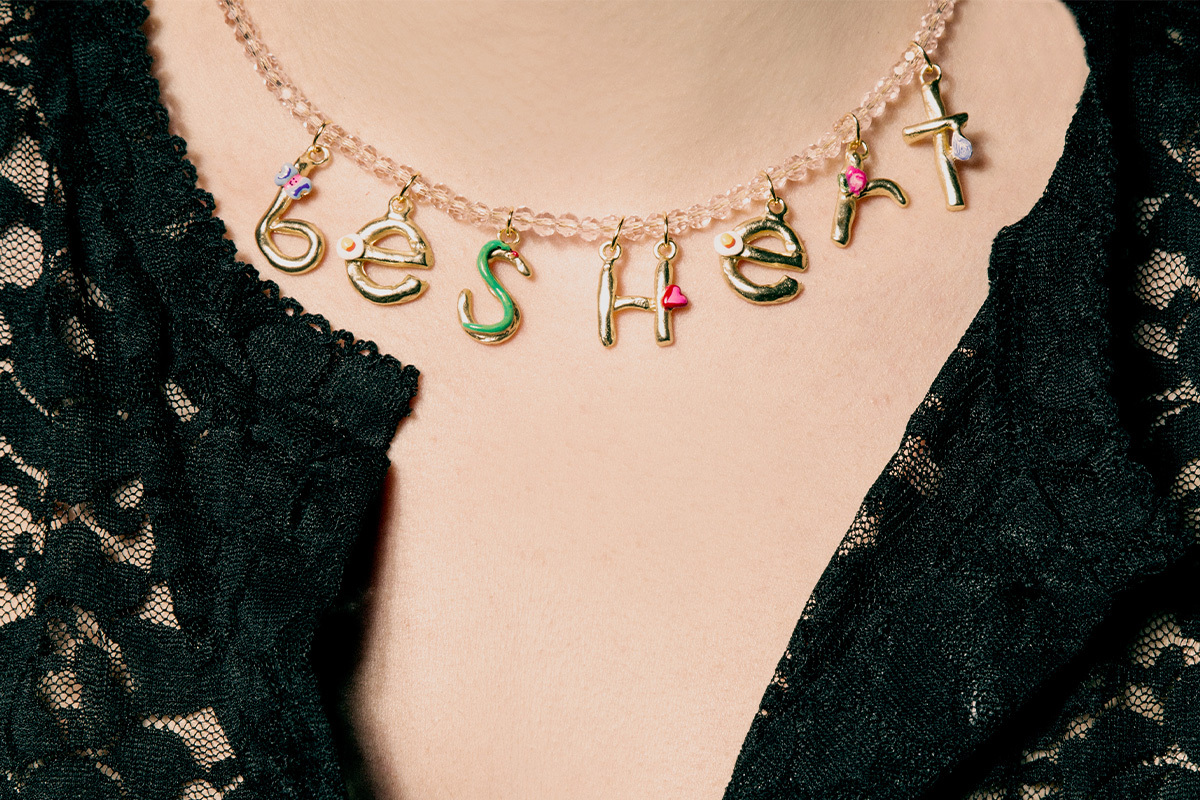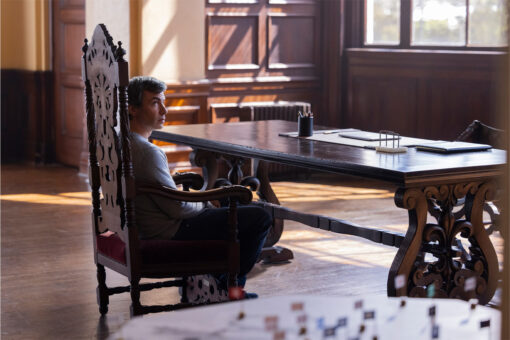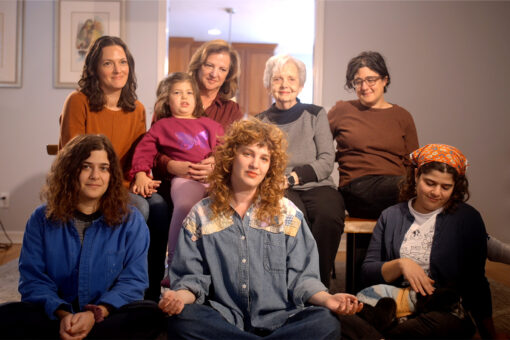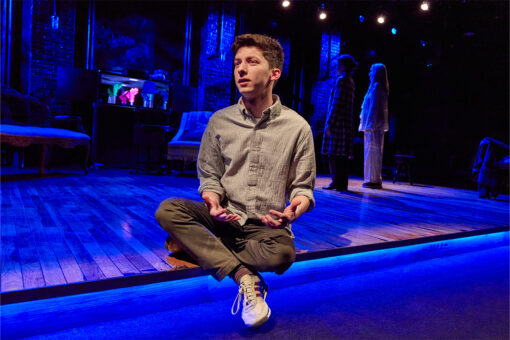To me, it never seemed like a matter of “if” Susan Alexandra would debut a Judaica line. It was always a matter of “when.”
Ever since the fashion brand, helmed by Jewish founder and designer Susan Korn, debuted in 2015, Jewishness has contributed to what makes Susan Alexandra so exuberant, playful and fresh. In February 2019, Susan Alexandra made its New York Fashion Week debut at Baz Bagel, a Jewish-style bagel shop. A few months later, Susan Alexandra held another NYFW event, this time a bat mitzvah-themed show featuring a lesbian klezmer band. Even the storefront boasts Jewish ties: Located at 33 Orchard Street on the Lower East Side, the Susan Alexandra store is at the geographical heart of both the New York fashion scene and the historical New York Jewish community. But amidst the vast catalog of Susan Alexandra’s signature beaded bags, jewelry and accessories, there have only been a few explicitly Jewish offerings.
Until now.
Debuting last month, and in honor of Susan Korn’s Holocaust survivor grandmother Rose, Susan Alexandra’s line of Judaica is everything chic young Jews, Jewesses and Jewexes could have possibly dreamed of and more. Featuring items like glitzy yarmulkes, whimsical mezuzahs, jewelry with Yiddishkeit charms, fruity dreidels and a show-stopping watermelon menorah, Susan Alexandra seems to have revivified the genre itself, making Judaica cool in 2022.
As if that weren’t enough, the launch party for the Judaica collection doubled as a Shabbat dinner. On a temperate November evening, a crowd of extremely fashionable culture vultures (including Mizrahi actor Ari’el Stachel, designer and model Ella Emhoff and queer writer and activist Adam Eli) gathered at Haven’s Kitchen in New York to see the line in all its glory. The Shabbat presentation, which featured a moodboard (including Korn’s family tree) to contextualize the line and Jewish delicacies like brisket, challah and babka, was more than just for show: An hour into the party, Rabbi Matt Green of Congregation Beth Elohim gathered the guests around to explain the importance of Shabbat, light the candles and say the appropriate blessings.
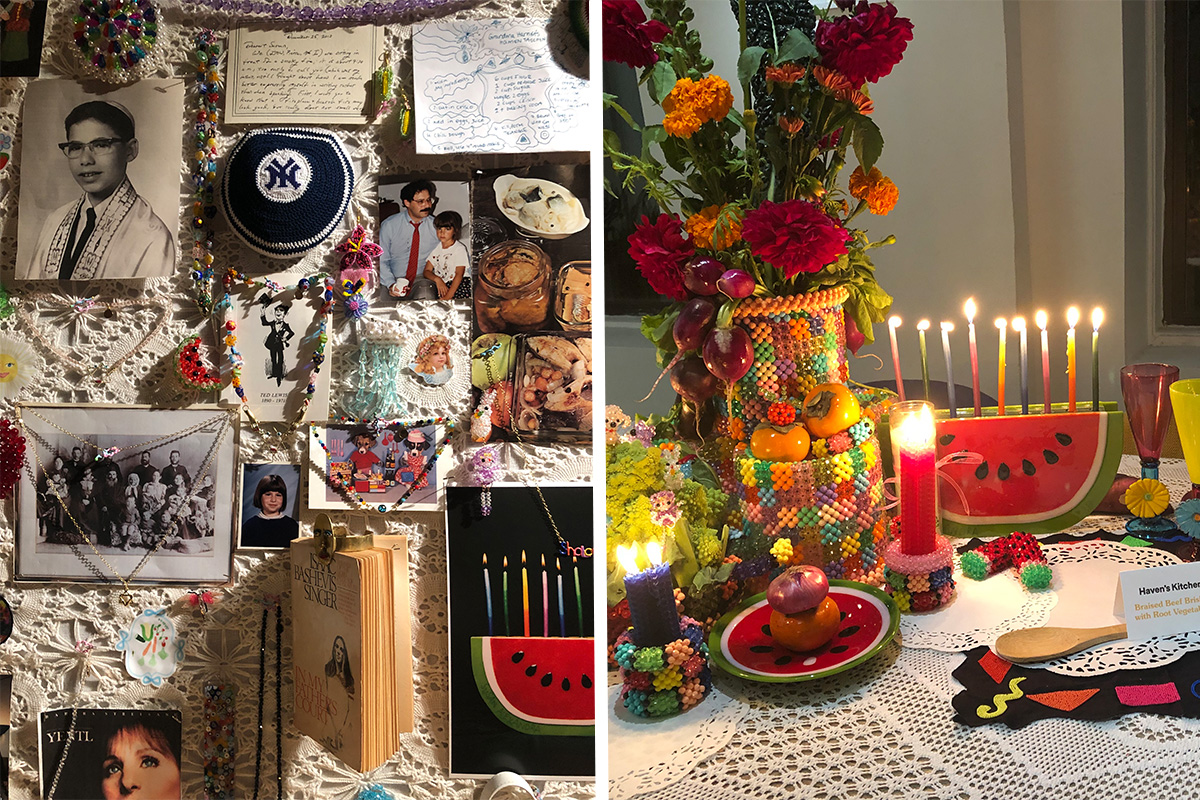
After the party, Hey Alma caught up with Susan Korn to chat about all things Susan Alexandra Judaica (including future drops!), what Jewish celebs she wants to collaborate with next and the sexiest Jewish fruit.
This interview is lightly edited and condensed for clarity.
First could you just tell me a bit about your Jewish background and identity?
I was born and raised Jewish, definitely more in the cultural sense. After I had my bat mitzvah and I got to make more choices about my Jewish education, I stopped going to synagogue. But it’s been a really important part of my identity. It’s something I think of myself as first and foremost. The older I get, the more I want to learn and the more I want to return to those roots.
I’m pretty obsessed with Jewish people. It’s funny because when I’m with my Jewish friends, if we’re talking about someone, we’re like, “And she’s Jewish!” It’s an interesting fact that I need to include in every interaction I have.
Same, it’s so fun. Also, I have to ask what was your bat mitzvah theme?
Passion for fashion!
Love it.
It’s very appropriate.
Definitely. So what inspired the Judaica collection? And how long has it been in the making?
A couple of things led to the Judaica collection. First, whenever I make anything, I really want to feel connected to it. When you have a design and a big launch, you really have to stand with it and behind it, because it takes so much from you and your team. And if you’re making something without feeling really strong or passionate, then you can sense it in the product. It’s an exhausting process. That’s why I try to only make stuff I really, really like. I can’t put energy into something I don’t believe in. So I really, really believed in this. And I felt like it was coming from a very personal place.
And the other thing is: I was looking at the market, because I wanted to buy a really cool menorah and a beautiful candlestick and mezuzah. And I couldn’t find anything that I really liked. And I was like, “OK, this is a sign for me that I need to take matters into my own hands and start creating and start curating.” It was a really long process, and it was a lot of work, but I’m really, really proud of it. And I feel like we’ve had such a good response because people are like, “I’ve never seen Judaica that wasn’t old-fashioned” or “This stuff really speaks to me.” And that was really, really special for me to hear.
That’s so wonderful! I had a very similar experience when I was mezuzah shopping for my first apartment. But your line feels so young and so fresh, I wonder if it’ll get more young people to connect to their Jewishness through Judaica.
I think that we do have a younger clientele, and I feel like, generally, the designs have a youthfulness to them. But we’ve also seen a lot of older people connecting with [the line] as well. So I think there’s room for fresh life in the Judaica world. The collection is relatively small — we have a bunch of jewelry, we sold out of some of the styles of mezuzahs and menorahs — but I want to keep adding because I’m getting such good information about what people look for and what they’re missing. Something really sweet is that at our store, where we debuted the collection, two young women came in and they started crying when they saw it because it’s really emotional for people, you know? Because it’s not just jewelry or mezuzahs, it’s feeling seen and part of a community. It’s really, really meaningful to me that people find so much meaning in it.
That’s fantastic. Do you have any thoughts already about what you would want to add to the collection?
I think for round two, which will be in April, we definitely have to do a seder plate,
Of course!
Obvi! The mezuzahs are really hard to make because they’re just such a specific shape and not a lot of artisans that we work with actually knew about them. But I really want to keep making special mezuzahs. And more home decor would be exciting: more wine glasses, more trivets, more plates. I’m really excited to keep adding to this and pulling inspiration from like my grandmother’s and my childhood.
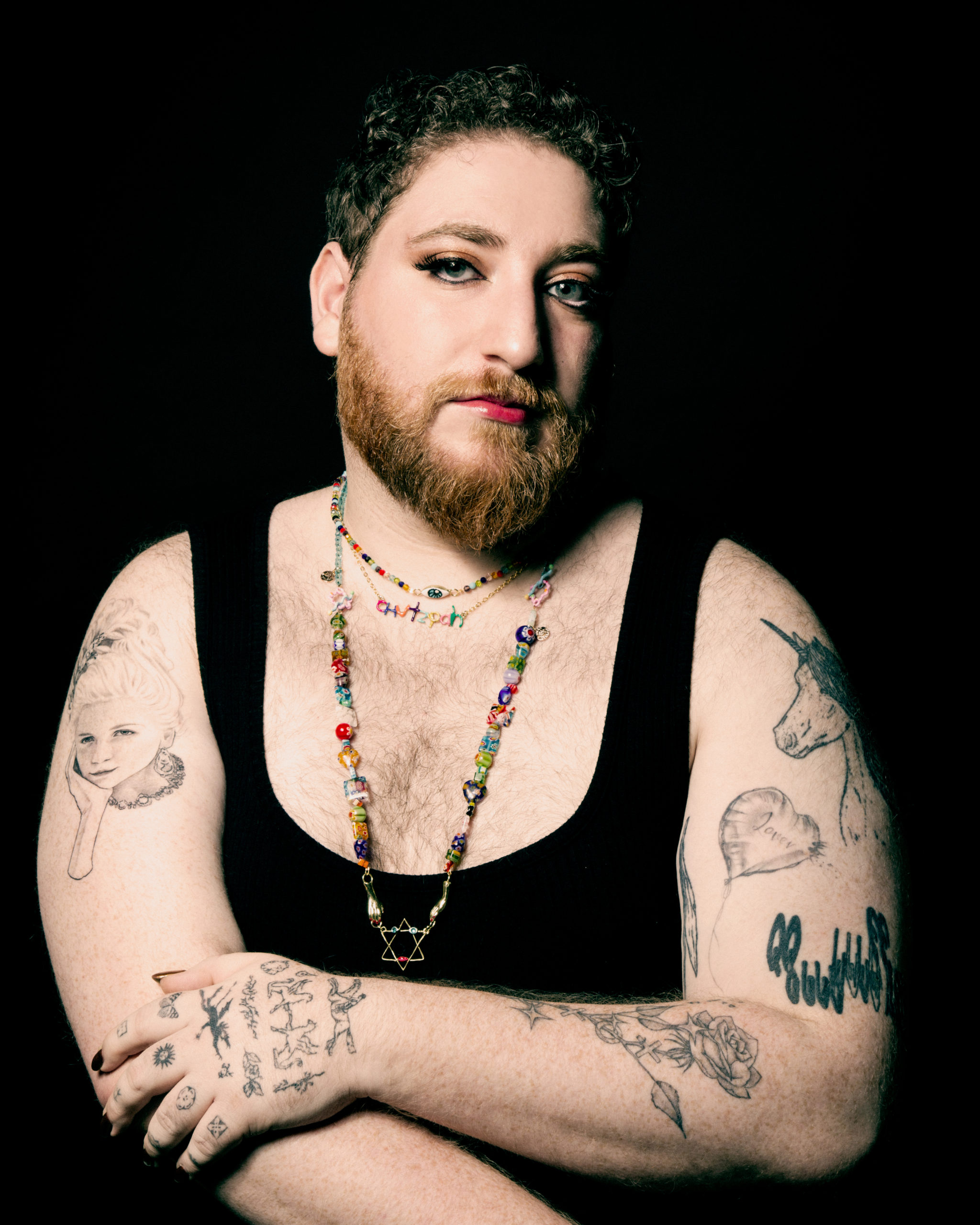
Do you have a favorite piece from the collection that’s currently out?
I love [the Sacred Star] necklace that I’m actually wearing right now. This necklace has a bunch of different glass beads and little eyes and then, at the center, it has this handmade Jewish star. It’s such a dazzling necklace, and then you look a little closer and you’re like, “Oh, it has a Jewish star!” I love that. It’s a beautiful necklace on its own, and then there’s the Jewish aspect.
That was a really big part of the line’s success, too. We’re not just making Judaica, we’re actually making pieces you want to wear regardless of the fact that they have a Jewish star or hamsa or Tree of Life.
For sure. Your launch party was a lovely Shabbat dinner. What would you say that Shabbat means to you?
Obviously there’s the actual, religious meaning to it. But I think that there’s also this safety in Shabbat. When I was growing up, we would do it every Friday night. I remember the smell of the candles and the brisket. I remember the sound of people’s voices singing the prayers. It felt, and still feels, like this safe space and a breath of relief. It feels so healing.
I also love how taken care of I always would feel: There was always so much food, and there were always people there who loved you. You were so accepted. I love that. Even now, if I go to a person’s house [for Shabbat] that I don’t know, I feel like I’m a part of their family. It’s this special thing that no matter where you are in the world, Shabbat holds the same meaning.
Definitely. I loved that Rabbi Matt Green was at the launch and said blessings. Why was it important to you to include those more traditional rituals?
When we announced the launch party, there were a lot of people who said, “Oh my god, I’ve never been to a Shabbat!” My friends who are not Jewish were like, “Can I come even though I’m not Jewish?” Since there were so many questions, I wanted a rabbi to lead [the Shabbat aspect] and do it in a really traditional way.
But the rabbi himself is a young, queer person. And I feel like it’s important to show Judaism in all of its aspects. So it was really important to me to have a rabbi who represented what I think about Judaism and the way that I practice it, which is very inclusive, and it’s very much about education and acceptance. I also wanted to show what a real traditional Shabbat looks like, so I felt like it added weight to the moment. And I mean, hanging out with the rabbi is kind of a big deal! To everyone who came into the party I was like, “And there’s a rabbi here!” like, “Yes, it’s true, I got the rabbi!” To me that was a really special part.
I loved that when he said the prayers, so many people in the room were saying them with him — people I didn’t even know were Jewish or people I didn’t even know had been to Shabbat were saying the prayers, and I was like, this is powerful.
It was powerful. I loved what you said earlier about showing different aspects of Judaism —that absolutely comes through with the people who modeled the line, like Ari’el Stachel and Adam Eli. It seems like it is important to you to have all kinds of Jews modeling your work – not just white, straight and/or Ashkenazi Jews.
Yeah. In the process of shooting and casting, I was like, “These are the people in my direct community. These are people I could text!” (Though some of the people I didn’t know, like Ari’el.) But it was really powerful to me that these people who have busy lives and busy jobs all came together for this. I’ve had so many strangers message me saying “I love what you did, and I want a model for your next campaign!” And I’m like, “Great, round two!” This is expanding my Jewish community. So when we do round two, I’m so excited to bring new people into my life.
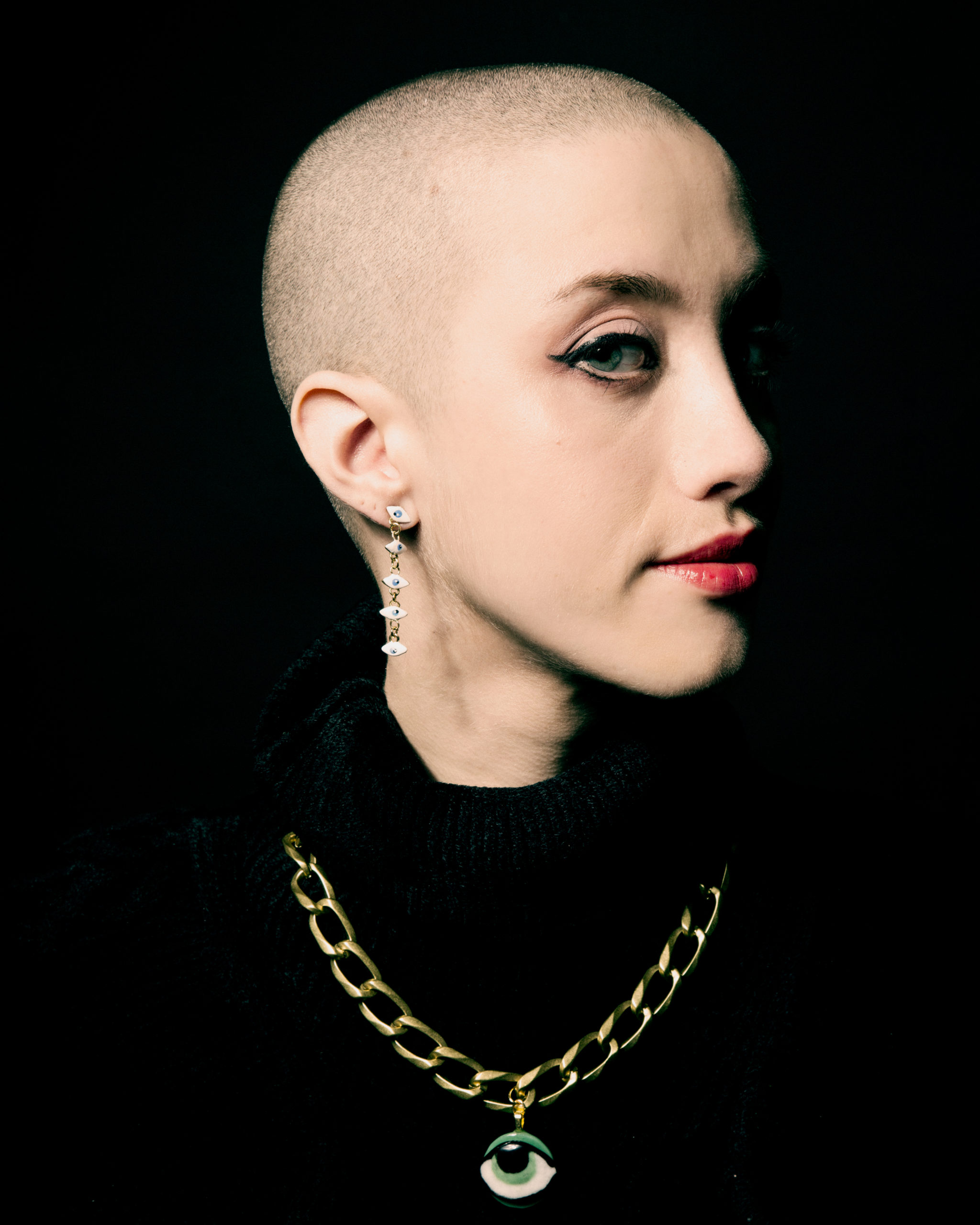
That’s beautiful. And was the “Yentl” album cover inspo for the photos?
Yes, it was! I made the photographer who shot the photos watch the movie. I was like, “All you need to do is watch ‘Yentl’ and you’ll know how to shoot this!” But for me, [the shoot] was really different… It had a lot more weight than other shoots we’ve done. Usually we do very bright colors, and there’s even more of a childlike aspect. But this one felt really grown up. This collection still feels whimsical and wonderful,. but it’s also serious. I wanted that to be conveyed through the photos.
Are there other Jewish celebs or influencers that you would love to collaborate with?
Oh my gosh. OK: Larry David, Jerry Seinfeld, Sarah Silverman, Amy Schumer… I mean, I love Sarah Sherman from SNL. I really like Gracie Abrams. Am I forgetting any big ones right now?
You had Chloe Fineman at a Comedy Cellar event, and I’d love to see more Chloe Fineman x Susan Alexandra collabs.
Chloe is amazing and regrammed the campaign, too. I mean, I feel lucky because I’ve already worked with some of my dream Jews, and these are all people that I really admire. But yeah, one day Sarah Silverman. Oh, and Susie Essman.
It’s been a little over a year since your store opened on Orchard Street. What has that anniversary meant to you?
When I was in the midst of planning for the one-year celebration, it was a lot, and I wasn’t able to just sit back and be like “Wow, I did this thing” — I did this thing that was really hard. It’s consistently a source of stress and agony and money. But I feel so proud that I was able to accomplish this. And every time something good happens at the store and we have these events that a lot of people attend, I feel so grateful and full of reflection, and I’m really, really happy this is my life. I feel so incredibly grateful, for sure.
I visited the store a few weeks ago and it was so busy!
Yeah! I mean, it’s retail, so there are high days and low days. But it’s one of those things where, even if you can’t quantify it with money, even on the days that aren’t great on sales, you still are connecting with new people and building this thing that everyone wants, which is community. So yeah, the store is doing well. It’s something I care about a lot. And I want to continue to expand it in other places. The dream is to have more stores. So I’m excited to keep on continuing that part of the business.
That’s great, mazel tov. It feels a bit redundant to ask at this point, but would you say that Susan Alexandra is a Jewish brand?
I would say it is very Jewish. I think it certainly wasn’t the way I started it; I didn’t launch with that intention. But it’s a very personal brand. It’s my name. It’s me. And I identify as a very Jewish person. So I would say so. And it’s not like that doesn’t bring its own set of considerations. If you’re proudly announcing who you are, no matter if it’s Jewish or anything else, you’re a target for many people. And I really hope that despite that, the brand will thrive. And I feel really proud and not afraid.
What would you say to people who love your Judaica, but might be nervous to wear a Jewish star necklace or hang a mezuzah because it means publicly identifying as Jewish?
It’s hard to say, “Don’t be afraid, go for it!” Because everyone needs to be comfortable being who they are in their own time. If you feel vulnerable expressing who you are with a Jewish star necklace, that’s valid. There are many ways to represent Judaism.
A lot of the symbols that I use in the collection, like pomegranates and eyes, are not just classified as Jewish. These are symbols across many cultures. So I would also say if you’re feeling a little bit too exposed with a Jewish star necklace, what about something with an eye or something with matzah ball soup or a bagel that doesn’t necessarily scream “I’m Jewish!” but expresses a sense of appreciation for the culture. But of course, people need to figure out how they want to express themselves, on their own time, in their own way.
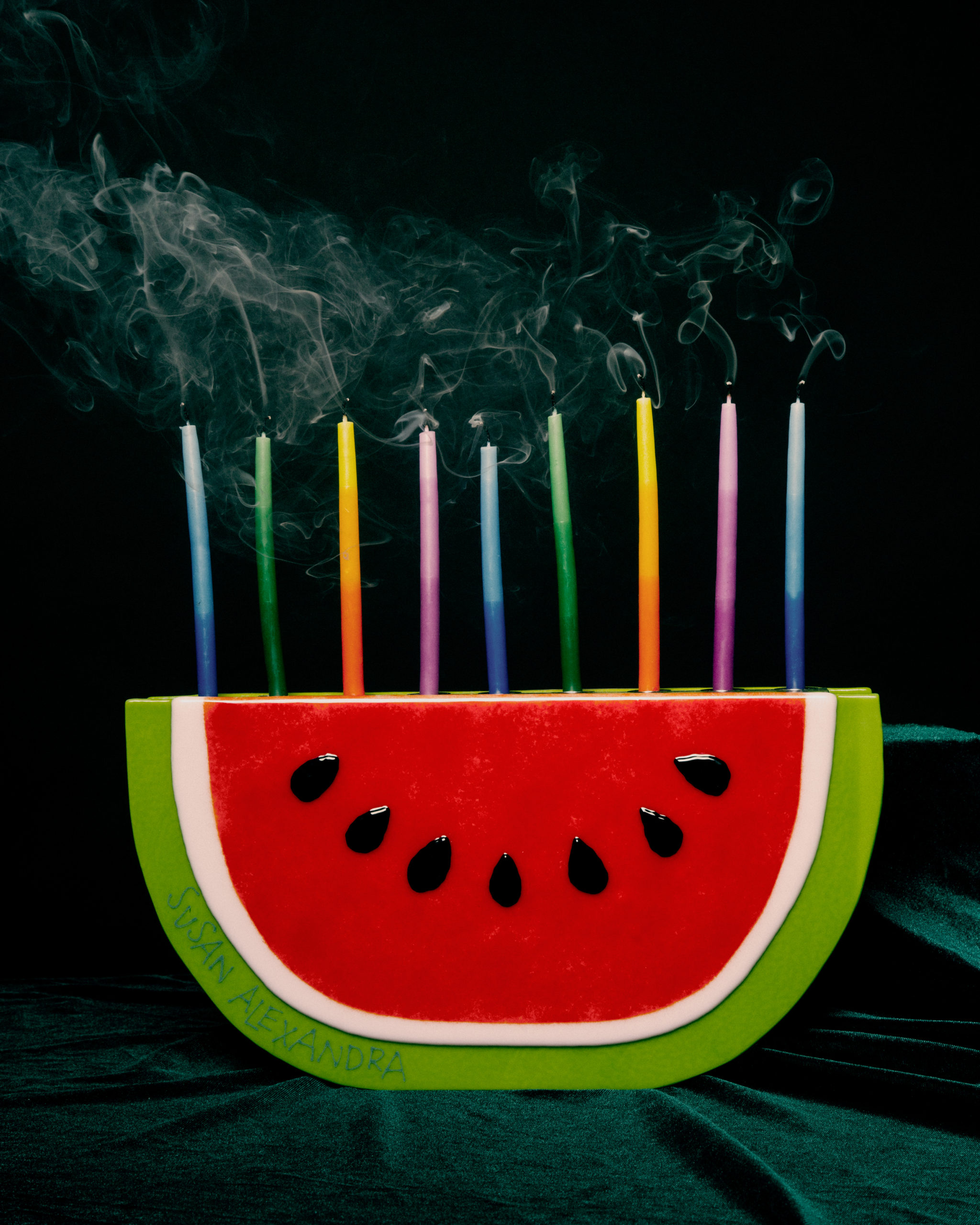
Agreed. OK last question: A lot of your designs incorporate fruit. In your opinion, what is the most Jewish fruit?
Hmm… It would be kind of an unsexy fruit, it would be the etrog. That is like the least sexy of the fruit. But if we’re going for sexy fruit: pomegranate. That is like the queen goddess of fruits. As you can see, I think in extremes – I think either really sexy or really lumpy and scary.
I would love to see if you’re able to incorporate an etrog at some point in your designs.
Etrog to come! That’ll be in our next Rosh Hashanah/Sukkot drop.
